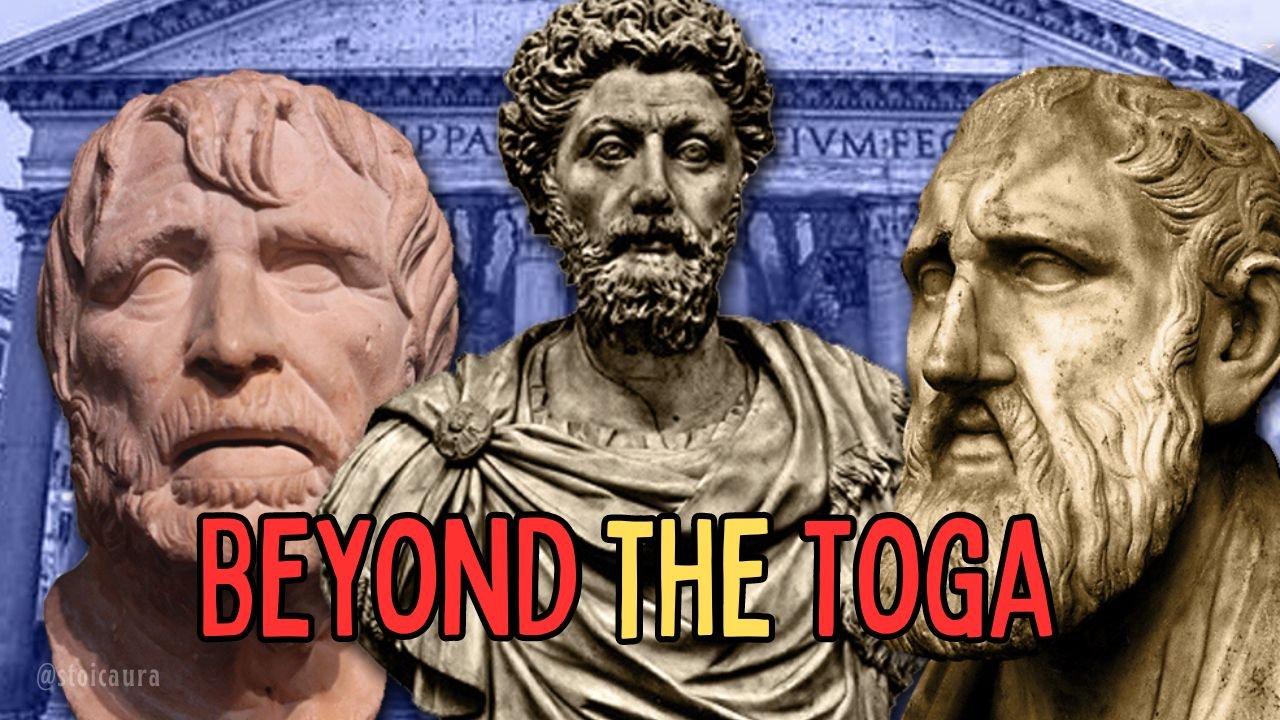
I. Introduction
A. Setting the Stage
- Brief explanation of Stoicism as a philosophical school
Stoicism, a venerable philosophical tradition embraced by prominent Roman philosophers, provides invaluable insights into leading a meaningful and resilient life. At its essence, Stoicism encourages cultivating the mind of a Stoic, fostering mental fortitude and emotional equilibrium amidst life’s uncertainties. Rooted in ancient Greek philosophy and refined by Roman thinkers like Seneca, Marcus Aurelius, and Epictetus, Stoicism emphasizes the importance of Roman virtues such as courage, wisdom, and temperance.
By practicing Stoic principles, individuals can navigate adversity with grace and integrity, harnessing their inner strength to overcome challenges and pursue virtuous living. This philosophical school offers practical strategies for mastering one’s thoughts and emotions, enabling individuals to lead lives of purpose, virtue, and inner peace.
- Introduction to the concept of the mind of a Stoic
The mind of a Stoic embodies a mindset characterized by resilience, wisdom, and virtue, as espoused by revered Roman philosophers. Rooted in the Stoic tradition, this concept emphasizes cultivating inner strength and moral integrity to navigate life’s challenges with grace and equanimity. Stoicism teaches individuals to cultivate self-awareness, discipline, and rationality, enabling them to respond to adversity with clarity and composure.
By embracing Stoic principles and embodying Roman virtues such as courage, wisdom, and temperance, individuals can attain a state of tranquility and fulfillment regardless of external circumstances. Through introspection, mindfulness, and ethical living, the mind of a Stoic empowers individuals to lead lives of purpose, resilience, and moral excellence, echoing the timeless wisdom of Stoic sages throughout history.
B. Overview of Roman Stoics
- Introduction to prominent Roman philosophers
Delving into the annals of history, we encounter a plethora of esteemed figures who have left an indelible mark on human thought and civilization. Among them, Roman philosophers stand out as beacons of wisdom and insight, shaping the intellectual landscape of their time and beyond. These luminaries, such as Seneca, Epictetus, and Marcus Aurelius, exemplified the ideals of the mind of a Stoic through their profound teachings and exemplary lives. Their philosophical inquiries into ethics, virtue, and the nature of existence continue to resonate with modern seekers of wisdom.
By embodying Roman virtues such as wisdom, courage, justice, and temperance, these philosophers inspire us to cultivate a deeper understanding of ourselves and the world around us, guiding us toward lives of purpose, resilience, and moral excellence.
- Importance of understanding their perspectives on the mind
Understanding the perspectives of Roman philosophers on the mind of a Stoic is not merely an academic pursuit but a journey toward personal growth and self-awareness. These ancient thinkers, deeply immersed in the pursuit of wisdom and virtue, offer invaluable insights into the human psyche and the quest for inner tranquility. By exploring their teachings on the mind of a Stoic and the cultivation of Roman virtues, we gain practical wisdom that can help navigate the complexities of modern life.
Their emphasis on resilience, moral integrity, and the pursuit of eudaimonia, or flourishing, resonates deeply in today’s fast-paced world, offering timeless principles for navigating adversity and finding fulfillment. Embracing their perspectives allows us to tap into a rich tradition of philosophical inquiry and draw inspiration from the wisdom of the ages.

II. Exploring the Minds of Roman Stoics
A. Roman Philosophers and their Views on the Mind
- eneca: Stoic practices for mental resilience
Seneca, one of the eminent Roman philosophers, offered profound insights into the mind of a Stoic and techniques for cultivating mental resilience. Through his letters and essays, Seneca emphasized the importance of Roman virtues such as wisdom, courage, and temperance in overcoming adversity and attaining inner peace. He advocated practices like premeditatio malorum, the contemplation of future misfortunes, to prepare the mind for challenges ahead. Seneca’s teachings encourage us to cultivate an attitude of acceptance toward life’s inevitable trials while maintaining a steadfast commitment to virtuous action.
By incorporating Stoic principles into daily life, we can develop greater mental fortitude and emotional resilience, allowing us to navigate difficulties with grace and equanimity. Seneca’s timeless wisdom continues to inspire countless individuals seeking inner strength and tranquility amidst life’s storms.
- Marcus Aurelius: Meditations on controlling the mind
Marcus Aurelius, renowned among Roman philosophers, offers profound insights into mastering the mind of a Stoic through his timeless work, “Meditations.” In this seminal text, Aurelius delves into the importance of maintaining inner tranquility amidst external chaos, emphasizing the power of reason and self-discipline. He underscores the significance of aligning one’s thoughts and actions with Roman virtues such as justice, courage, and wisdom. Through reflective exercises and philosophical contemplation, Aurelius teaches us to cultivate a resilient and virtuous mindset, capable of withstanding life’s trials and tribulations.
By practicing mindfulness and maintaining a steadfast commitment to moral principles, we can attain greater clarity, equanimity, and inner peace. Aurelius’s enduring wisdom continues to resonate with individuals seeking guidance on navigating the complexities of the human experience with grace and resilience.
- Epictetus: Techniques for cultivating a Stoic mindset
Epictetus, one of the eminent Roman philosophers, provides invaluable insights into shaping the mind of a Stoic through practical techniques in his teachings. Central to his philosophy is the notion of focusing on what lies within our control while accepting what does not. By embracing this dichotomy, individuals can cultivate resilience and inner peace regardless of external circumstances. Epictetus emphasizes the importance of living in accordance with Roman virtues such as wisdom, courage, and temperance, advocating for self-awareness and ethical conduct in all aspects of life.
Through practices like negative visualization and philosophical reflection, he encourages individuals to develop a steadfast mindset grounded in reason and virtue. Epictetus’s teachings continue to offer timeless wisdom for those seeking to lead a life of purpose, integrity, and tranquility in today’s world.
B. Key Concepts of the Stoic Mind
- Acceptance of fate and embracing the present moment
Embracing the present moment and accepting fate are fundamental aspects of the mind of a Stoic, as emphasized by various Roman philosophers. They advocate for living in accordance with the Roman virtues of wisdom and resilience, acknowledging that certain events are beyond our control. Instead of resisting or lamenting over circumstances, Stoics encourage individuals to focus on the present moment, making the most of what they have and finding contentment in their current situation.
This approach fosters a sense of inner peace and tranquility, allowing individuals to navigate life’s ups and downs with grace and equanimity. By embracing the present moment and accepting fate, Stoics cultivate a mindset that is grounded in reality and better equipped to handle the challenges of life.
- Virtue ethics and living in accordance with nature
Virtue ethics and living in accordance with nature are central tenets of the mind of a Stoic, championed by influential Roman philosophers. Stoicism teaches individuals to prioritize moral virtues such as wisdom, courage, temperance, and justice in their actions and decisions. By cultivating these virtues, individuals align themselves with the natural order of the universe, as advocated by Stoic thinkers like Seneca, Marcus Aurelius, and Epictetus. Living in accordance with nature involves embracing the inherent rationality and orderliness of the cosmos, accepting the inevitability of change, and striving to live virtuously in harmony with one’s surroundings.
This philosophy encourages individuals to focus on what is within their control, maintain a sense of inner tranquility, and lead a life guided by moral excellence and integrity. Through virtue ethics and living in harmony with nature, Stoics aim to achieve a state of eudaimonia, or flourishing, characterized by inner peace and fulfillment.
- Developing inner tranquility amidst external turmoil
In the mind of a Stoic, maintaining inner tranquility amidst external turmoil is a fundamental practice advocated by Roman philosophers. Stoicism teaches individuals to cultivate a sense of equanimity and resilience, even in the face of adversity. By focusing on what they can control—namely, their thoughts, attitudes, and actions—Stoics are able to navigate challenging circumstances with grace and composure. Drawing inspiration from figures like Seneca, Marcus Aurelius, and Epictetus, Stoics recognize that external events are beyond their control, but their reactions and interpretations are within their power.
Through the cultivation of virtues such as wisdom, courage, and temperance, individuals can develop the inner strength to withstand life’s trials and tribulations, finding solace and serenity amidst the chaos of the world.

III. Applying Stoic Wisdom to Modern Life
A. Incorporating Stoic Practices into Daily Routine
- Mindfulness exercises inspired by Stoic principles
Stoic philosophy emphasizes the importance of cultivating virtues such as wisdom, courage, justice, and temperance to attain inner tranquility and lead a virtuous life. By aligning one’s actions with these Roman virtues, individuals can navigate life’s challenges with grace and resilience. For example, practicing wisdom involves seeking knowledge and understanding to make informed decisions, while courage entails facing fears and adversities with bravery and resolve. Justice requires treating others fairly and acting in accordance with moral principles, fostering harmonious relationships and societal well-being. Temperance encourages moderation and self-control in desires and emotions, promoting balance and equanimity. By embracing these virtues and striving to live in accordance with nature, individuals can cultivate inner peace and fulfillment, even amidst external turmoil. Stoic teachings provide a timeless guide for achieving mental and emotional well-being, offering practical wisdom that remains relevant in today’s fast-paced world.
- Stoic journaling for self-reflection and growth
Stoic journaling is a powerful tool for self-reflection and personal growth, inspired by the teachings of Roman philosophers like Marcus Aurelius, Seneca, and Epictetus. By engaging in regular reflection on their thoughts, actions, and emotions, individuals can cultivate the mind of a Stoic and deepen their understanding of Stoic principles. Through journaling, one can explore their values, virtues, and areas for improvement, fostering greater self-awareness and resilience in the face of life’s challenges. Writing down daily experiences, gratitude, and affirmations can also help individuals reinforce positive habits and cultivate a mindset aligned with Roman virtues such as wisdom, courage, and temperance.
Stoic journaling serves as a practical tool for integrating Stoic philosophy into daily life, empowering individuals to lead more intentional, fulfilling lives.
B. Cultivating Virtue in a Modern Context
- Practicing courage, wisdom, and temperance in everyday life
Practicing courage, wisdom, and temperance in everyday life is a cornerstone of Stoic philosophy, championed by Roman philosophers such as Marcus Aurelius, Seneca, and Epictetus. Cultivating the mind of a Stoic, individuals strive to embody these Roman virtues in their actions and decisions, enriching their lives and relationships. Courage enables one to confront challenges with resilience and determination, wisdom guides thoughtful decision-making rooted in reason and virtue, and temperance fosters moderation and self-control in pursuit of a balanced life. Whether facing adversity, making choices, or navigating relationships, integrating these virtues into daily practices empowers individuals to lead more meaningful and fulfilling lives.
By embracing these ideals, individuals honor the legacy of Stoic philosophy and embody its timeless wisdom in the modern world.
- Overcoming adversity with Stoic resilience and fortitude
In the face of adversity, Stoic resilience and fortitude, championed by Roman philosophers like Seneca and Marcus Aurelius, offer invaluable guidance. Cultivating the mind of a Stoic, individuals draw strength from Stoic principles to navigate life’s challenges with grace and determination. By embracing the virtues of courage, wisdom, and temperance, Stoics learn to confront adversity with resilience and adaptability. Seneca’s writings, for example, emphasize the importance of maintaining inner tranquility amidst external turmoil, while Marcus Aurelius’ Meditations offer reflections on accepting fate and finding strength in the present moment.
Through Stoic practices like journaling, mindfulness, and self-reflection, individuals develop the resilience needed to overcome obstacles and emerge stronger on the other side. In essence, Stoicism provides a timeless blueprint for navigating life’s hardships with grace and fortitude.
IV. Conclusion
- Recap of key insights from Roman Stoics
Through the wisdom imparted by Roman philosophers and their exploration of the mind of a Stoic, we glean timeless insights into the pursuit of virtue and resilience. Seneca’s teachings on embracing adversity and finding inner peace resonate deeply, while Marcus Aurelius’ emphasis on mindfulness and acceptance guides us in navigating life’s uncertainties. Epictetus’ emphasis on cultivating a mindset of self-discipline and moral integrity inspires us to lead lives aligned with our highest values.
By embracing Stoic principles and embodying Roman virtues such as courage, wisdom, and temperance, we equip ourselves with the tools necessary to thrive in the face of adversity. In essence, the teachings of Roman Stoics serve as a beacon of light, guiding us towards a life of fulfillment, purpose, and inner peace.
- Encouragement for readers to embrace Stoic philosophy for personal development
Embracing Stoic philosophy offers a transformative path towards personal development and inner resilience, drawing wisdom from the teachings of Roman philosophers who delved into the depths of the mind of a Stoic. By embodying Roman virtues such as courage, wisdom, and temperance, individuals can cultivate a mindset of strength and clarity, enabling them to navigate life’s challenges with grace and fortitude.
Through practices like mindfulness, self-reflection, and Stoic journaling, one can harness the power of ancient wisdom to foster growth and fulfillment in modern times. As Seneca, Marcus Aurelius, and Epictetus exemplified, the principles of Stoicism provide a guiding light amidst the complexities of existence, offering solace and guidance to those who seek it. Embrace Stoic philosophy, and embark on a journey of self-discovery and personal mastery.
FAQs
- What is Stoicism?
- Who were the famous Stoic philosophers?
- What are the key principles of Stoicism?
- How can Stoicism benefit modern life?
- Is Stoicism compatible with other belief systems?
- Where can I learn more about Stoicism?







